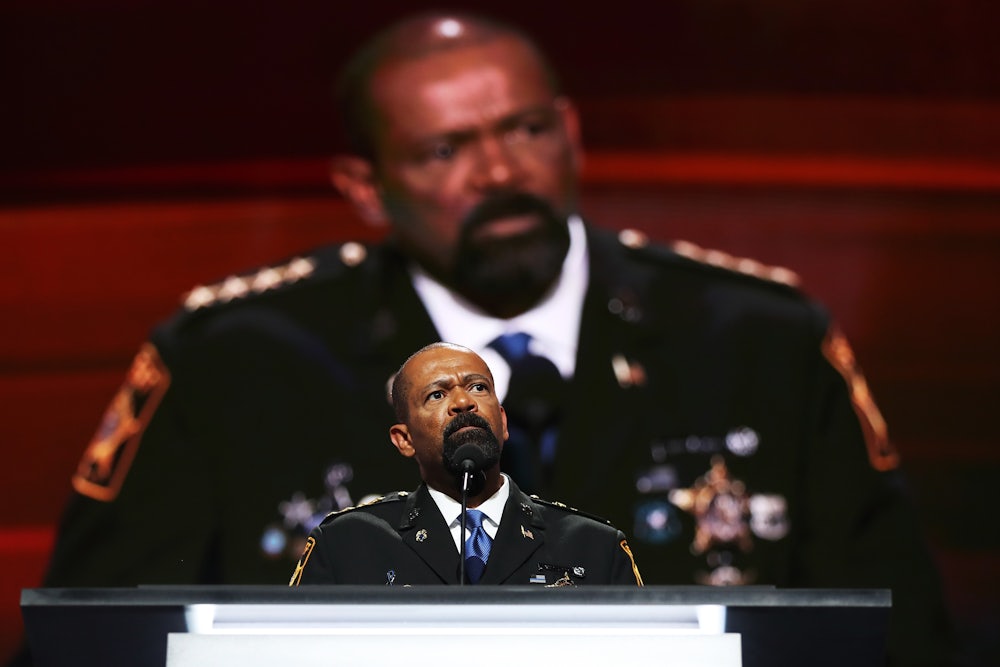Despite his history of inflammatory, racist rhetoric, there are times when Donald Trump can be circumspect. This election cycle, he’s focused most of his bigotry on immigrants, whether the undocumented from Mexico or Muslims from the Middle East (or judges from Indiana). He’s been a bit more careful in how he treats African-Americans—not tolerant, exactly, but also not calling for a wall around Chicago either.
To judge by the Republican National Convention in Cleveland, though, Trump might have to give up even the limited solicitude he’s shown Black America. On the issue 0f black-white relations, it seems like the GOP is to the right of Trump, and that party members are raring for a fight against Black Lives Matter and the newly resurgent civil rights movement.
To be sure, Trump has a sordid history in this area. He and his father both ran into legal trouble for refusing to rent to black tenants in the 1970s. In 1989, Trump paid for an ad calling for the execution of five black teens wrongly convicted of rape. And in 2011, Trump launched his current political iteration as a darling of the Republican right by proclaiming his doubts about President Barack Obama’s citizenship. And in April 2015, before declaring his candidacy, he said, “Our great African American president hasn’t exactly had a positive impact on the thugs who are happily and openly destroying Baltimore.”
Still, as a 2016 candidate, Trump has sent a mixed message on black-white racism. He’s tweeted out fake crimes statistics that falsely made it look like African Americans were responsible for most murders of white people, and he flirted with David Duke. But in an interview earlier this month with the Associated Press, he balanced a call for “law and order” with acknowledgements that the criminal justice system is flawed. About the killings of Philando Castile and Alton Sterling, Trump said, “I thought they were horrible, horrible to witness. Whether that’s a lack of training or whatever, but I thought they were two incidents that were absolutely horrible to witness.” In his ham-fisted way, Trump has sought to use celebrity friends like Mike Tyson, Don King, and Omarosa for outreach to African-Americans.
On the first night of the Republican convention, though, some of the loudest applause went to speakers who went after Black Lives Matter, notably Milwaukee Sheriff David A. Clark, Jr. (who proclaimed “Blue Lives matter in America” and celebrated the acquittal of a Baltimore officer in the death of Freddie Gray), former New York City Mayor Rudy Giuliani, and Senate candidate Darryl Glenn of Colorado. Clark and Glenn are both African-Americans, and thus implicitly reassured the audience that opposing the agenda of Black Lives Matter wasn’t racism. Indeed, Clark acknowledged this fact when he said, “Somebody with a nice tan has to say this: All lives matter.” (These remarks were apparently ad-libbed since they didn’t appear on the printed version of the speech.)
The rousing applause for Clark and Glenn suggested that the audience hungered for proof, from black people themselves, that the problem with America is not racism and police brutality but black misbehavior. This was the theme of Glenn’s speech:
We can bring this country together.
But you must realize that our heroes in “Blue” are part of the solution and not the problem. Nobody wants bad cops off the street more than good cops!
But to heal our communities, more men need to start helping in the care of their children.
Safe neighborhoods happen when fathers and mothers are in the home.
Giuliani, meanwhile, has a notoriously troubled relationship with the African-American community. He, too, was cheered on during an unhinged rant in which he said Americans fear for their safety because police officers “are being targeted, with a target on their back.”
The audience became energized whenever the police were defended and Black Lives Matter attacked. Trump might be treating black-white relations in a relatively gingerly manner, but it’s clear his base wants him to take the gloves off and proudly proclaim “Blue Lives Matter” and “All Lives Matter.” The question is, will Trump listen to his audience, and take his campaign even further into the territory of returning America to an overt racism they haven’t seen since the 1960s.
